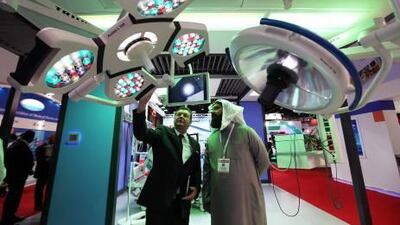In every hotel in the city centre, there was almost certainly a doctor in the house as the last recession-proof industry rolled into town.
Long queues began to form outside the Arab Health exhibition in Dubai from midmorning in a scene that harked back to the exhibition hustle and bustle of the emirate's boom years.
Back then it was property that drew the crowds.
Yesterday, it was hospitals as some of the biggest names in the global health industry descended on a region that is expected to triple its healthcare spending to some US$133 billion (Dh488.51bn) within five years.
Ceyhan Turhan looked like he needed to stretch out on one of the hospital beds he was trying to sell in the exhibition's teeming Turkish pavilion yesterday afternoon.
"I must have talked to 100 people today," said Mr Turhan, a director at Isik Kardesler, as a group of 15 doctors huddled around the stand of the bed maker.
Demand from companies wanting to showcase their products was so strong that the organisers were forced to use corridors and outside areas to accommodate them - and that still left an estimated 400 companies on the waiting list.
"We estimate that about $300 million is being injected into the Dubai economy," said Peter Rigby, the chief executive of Informa, the event organiser. "That includes the air flight tickets from exhibitors globally, their hotels, entertainment and so on."
The healthcare sector has emerged as one of the biggest winners from a year of economic stimulus throughout the Arab world as investment pours in for the construction of new hospitals and clinics.
And as health budgets in other regions have been among the first casualties of austerity measures, manufacturers and service providers from those countries are increasingly looking to the Middle East.
That trend is reflected in the visitor numbers of this year's show. The number of Chinese exhibitors surged 40 per cent to 428 while exhibitor numbers from India as well as the UAE, also increased.
Some of the biggest spending is coming from Saudi Arabia, where 420 health projects were launched last October with plans for another 127. Yet the surge of investment has also produced a shortage of healthcare professionals, which could hamper progress, Booz and Company has warned.
Such pressures are already being felt in the Emirates where it emerged this week that health inspectors in Sharjah closed a 60-bed private hospital due to a shortage of doctors, nurses and equipment.

